- Home
- Raymond Benson
Blues in the Dark Page 2
Blues in the Dark Read online
Page 2
“Are you with the realty company, Mr. Trundy?”
“No, ma’am, I’m the landlord. I look after the house. I’ve been doing this for almost fifty years.”
“My, my. Well, I’m captivated.”
“Would you like to see the place?”
“By all means.”
Despite the antiquity on display, everything appeared clean. The house smelled old, but it wasn’t unpleasant. Trundy led her past the wooden stairs on the left that obviously led to the second floor and into a large dining room containing a long table set for fourteen. Visually, the space had an eclectic style of verdure artwork, heavy dark furniture, bright ceramics, and wrought iron accents. Oak floor. The wood-beamed ceiling sported carved rams’ heads.
On one wall was a large painted portrait of a very pretty blond woman dressed in a formal gown.
“It’s beautiful,” Karissa said. She nodded at the painting. “Who is that?”
“She is the former owner of the house. She lived here in the late forties.”
“Really? I’m surprised.”
“Why?”
“Wasn’t this a black neighborhood then?”
Trundy shook his head. “West Adams Heights started as an all-white neighborhood. When black celebrities started buying and moving in to houses in the early forties, there were residents who tried to get them evicted. There were covenants that prohibited black people from residing here. A number of those black celebrities fought back and won the right to live here in the state courts. That paved the way for the Supreme Court decision in 1948 that struck down legal housing discrimination.” He nodded at Karissa. “But, in a way, you are correct. Sugar Hill became more of a black neighborhood in the late forties, fifties, and sixties. There were still white folks living here, though. Blair Kendrick was one of them, that is, until 1949.”
Karissa wrinkled her brow. “Blair Kendrick … why does that name sound familiar?”
“She was an actress. Movie star. For a while.”
“Oh, right. Isn’t she that film star who was killed by the mob or something?”
Trundy pursed his lips and gave a slight nod.
“Wait. She made a few film noir pictures in the forties, right? Always played what they call a femme fatale—the bad girl. Then she got in trouble and … what? She was murdered?”
“Yes, I’m afraid so.”
“Am I correct to say that she was killed because she witnessed a high-profile murder? Some Hollywood bigwig?”
“Eldon Hirsch. He was the head of Ultimate Pictures.”
“Oh, right. I remember that now. She was under contract with Ultimate Pictures, wasn’t she?”
“I believe so.”
“And she lived here?”
“That’s right. Many of her things are still in the house, too. Upstairs and in the basement, you’ll find a lot of what they call ‘ephemera.’”
“Oh, Lord. Let’s keep looking.”
He showed her the kitchen, which was big enough to accommodate three or four chefs at work. “Everything is functional, although a few appliances are in disrepair. I can show you which ones to avoid using. Not to worry—you have a stove and refrigerator. They were replaced within the last ten years. There’s even a dumbwaiter.” He pointed to a door at the side. “That leads to the servant’s bath, and the door beyond that goes into the garage, where you can park your car. I’m afraid there is no automatic garage door. The garage is just open to the driveway.”
“There’s also not a fence around the property,” Karissa said. “I noticed all the other houses on the block have these wrought iron fences.”
“Those weren’t built until the sixties and seventies. None of the houses had fences back in the day. No one was residing in this house during the sixties and seventies, so a fence was never erected.”
“Is there much crime in the neighborhood? Would I be safe?”
He shrugged. “The neighborhood declined in the sixties, and there was a lot of crime then and the next couple of decades. Not so much now. The area has become quite diversified.” Just like Serena had said. “Do you know the largest church catering to the African American community in Los Angeles is right here at the end of the block?”
“No, I guess I didn’t.”
“The First African Methodist Episcopal. Decades ago they met in a house in the neighborhood; now they have that big building on the corner.” He looked at her as if he were trying to determine how much African American blood she had in her. Karissa, being light-skinned but certainly not pale enough to pass as white, often endured this kind of scrutiny from both races. It was not a pleasant experience, but she had grown up with it. “Are you from Los Angeles, Ms. Glover?”
“I’m from Sacramento originally, but I went to UCLA and stayed here.”
Trundy nodded and then indicated a smaller, adjacent room off the kitchen. “The laundry machines here in the utility room are also functional.” Another door led to a bright room with a dining set. A large window looked out into the backyard, which was not in as good a shape as the front. “This is the breakfast room, or ‘morning room,’ as they called it in those days.”
“How quaint!”
He led her back through the dining room and under an arch to the expansive “parlor,” as he called it. It contained more antiques, as well as framed movie posters. Pictures that starred Blair Kendrick. A grand piano that had seen better days sat at one end of the room, adorned by several framed photographs. Blair Kendrick was in all of them, posing alone or with other stars of the day—Robert Mitchum, Ray Milland, James Cagney, Dana Andrews …
“Oh my gosh!” Karissa gasped. “Are those original posters?”
“I believe so, yes.”
The Jazz Club. A Dame Without Fear. A Kiss in the Night.
“I love old movies, but I don’t think I’ve seen any of these. I’m a film producer. I work in Hollywood.”
“Do you now?”
“Yes, sir. I coproduced Second Chance, the one about the fellow who dies and goes to argue his case with Saint Peter so he can have another chance back on earth?”
Trundy shook his head. “I didn’t see it. Sorry.”
She raised her eyebrows and gave a little laugh. “Well, you weren’t the only one. The critics liked it, though.” She shook her head. “Those posters are probably worth something. I don’t know why I haven’t seen these movies. Do they crop up on Turner Classic Movies at all?”
“No,” he answered with a curious finality.
Karissa stood in the middle of the room and surveyed it. She couldn’t help making a full turnaround, taking it all in. “This is more like a ballroom! You could throw a nice party in here.”
“I’m sure that’s what it was used for, ma’am. You’ll find that the piano has not been tuned in decades, though.”
She went over to it and picked up one of the framed pictures, a typical studio publicity portrait. In it, Blair wore a striking string of pearls around her neck.
“She was gorgeous.”
“Blair Kendrick was a flame that burned very brightly for a short time. Hardly anyone remembers her these days.”
“She doesn’t look like a femme fatale here.”
Trundy made a disapproving grunt. “Shall we see the rest of the house?”
Karissa picked up on his tone and said, “Do you … I’m sorry, do you have a connection with Blair Kendrick?”
“I just look after her house, ma’am.” He turned his head and gazed lovingly at the surroundings. “She’d be in her nineties if she were still alive. But she’s buried in Westwood Village Memorial Park.”
Karissa knew of it; many stars and Hollywood executives were interred there. Marilyn Monroe. Jack Lemmon. Natalie Wood.
“Who owns the house now?”
“An investment firm, or trust fund, or law firm, or something. I don’t understand these things. I just collect my paycheck in the mail and take instructions from a group of attorneys.”
“I see.”
/> He next took her through double folding doors at the back of the parlor to the “conservatory,” which was an enclosed porch that spread behind the parlor and kitchen. Large windows here also looked out into the backyard. A door opened to steps that led outside. The space contained two card tables and a pool table. She must have liked to play games, Karissa thought.
They went back into the parlor, out into the foyer, and to a room on the opposite side of the house, which he called the study. Inside was a desk, and more old furniture.
“Good for a home office,” she said. “Is there, uh, cable? Internet?”
“I am arranging for that to be installed. You won’t find a television in the house, though. If you want one, you’ll have to supply it yourself.”
Karissa wondered why the house wasn’t already wired. “Mr. Trundy, how long has it been since someone lived here?”
“Decades. You will be the first renter since Blair Kendrick … moved out.”
“Why hasn’t the place been rented until now?”
Trundy held out his hands. “The owners didn’t want to rent it. Now they do.”
No wonder the house looks like it has just sat here since the forties …
“And the owners had you keep it clean all these years, but they never renovated it?”
“Me and my mother before me. Yes. Shall we go upstairs?”
“Please.”
They ascended the curving staircase to the second floor, where entrances to six bedrooms jutted off a main hall. One of the bedrooms was full of boxes and a trunk. “Those are Ms. Kendrick’s things. We’ve never known what to do with them. Maybe since you work in Hollywood, you might have a suggestion.”
“You mean I can look through them?”
He just nodded and continued the tour. The master bedroom was again adorned with Blair Kendrick movie posters and photographs. A four-poster king-sized bed dominated the space. Floor-to-ceiling windows opened and looked out at the Santa Monica Freeway.
“It once had a much better view, I’m afraid,” Trundy said.
“Oh, that’s a shame, isn’t it? Does it get very noisy at night?”
“It’s about like what you hear now.”
The sound of the speeding cars wasn’t too obtrusive. Perhaps if she pretended the roar was the ocean and not that of traffic …
“You could always sleep in one of the other bedrooms,” he suggested. “They are each equipped with beds and dressers.”
“But this one’s so exquisite. I’ll think about it. So, tell me, Mr. Trundy. What’s the rent? I’m not sure I can afford such an opulent place.”
“One thousand a month.”
Karissa’s jaw almost dropped, but she retained her composure. What a steal! Too good to be true!
She made a face and pretended to peer at the furniture and walls more closely. The wallpaper was peeling in places. The dresser, bed, and nightstands were definitely … old. The initial impression of antique opulence had quickly given way to the truth that the house was badly in need of an update. Still—it was livable. She’d have everything she would need. As a rental, it could be temporary. Or not. Maybe she’d fall in love with the place and want to renovate it herself—if and when her next production made millions of dollars in profit. She almost laughed aloud at that thought.
She looked at Trundy, who raised an eyebrow, as if to say, Come on. You know it’s a good deal.
“All right, I’ll take it. When can I move in?”
“As soon as you’d like.”
As they walked down the stairs to see the back porch and yard, Karissa said, “This place might be inspirational. My partner and I are developing a new movie. We’d like to do a crime story, a thriller. This business of Blair Kendrick being killed, and with her being a white woman living in this neighborhood when more black celebrities were populating it—I think there could be some social relevance. I’m going to have to dig into more of the history of West Adams Heights. What do you think?”
He paused and looked at her when they reached the floor. “Do you know anything about racism, Ms. Glover?”
She was a little shocked by his question. “Mr. Trundy, I’m mixed race.”
“I can tell that by looking at you. How much? Half? A quarter?”
That made her prickle. “I don’t know. I was adopted. I’ve never had DNA testing or anything like that. So, what do you mean? Because I’m mixed race, you don’t think I’ve experienced racism in my lifetime?”
He shook his head. “My apologies, Ms. Glover. My question was way too personal. I’m an old man. I have old-fashioned ideas. And I don’t know anything about the movies. I don’t go to the movies.”
She narrowed her eyes at him. “What’s Serena’s connection to you? I never found out her last name.” He wrinkled his brow, and she pressed on. “On the phone I said that a woman named Serena told me about the place.”
“Oh, yes. The owners must deal with her. I don’t know her. Would you like to see the lease?”
A house with a history. A former owner involved in a juicy Hollywood crime. Karissa hadn’t expected to be thinking about murder that day, but perhaps she had stumbled upon the genesis of her next film project.
After a moment’s hesitation, she answered, “Please.”
3
THE MOVIE
The advance press screening continues. After the main title credits, the theme music reaches a climax and then diminishes to underscore, as the film opens on an aerial view of Hollywood. Black and white. Day.
A female voice-over commences. “They say that Hollywood is a land of dreams. That’s what I thought at first, too. I suppose for some, it is. For others, like me, it was the stuff of nightmares. Tinseltown, for all its glamour and glitz, for all its money and class, and for all its dedication to providing an escape for human beings via the flickering images on a movie screen, it’s really just a big lie. I know. Hollywood seduced me, chewed me up, and spit me out. I was the celebrated ‘bad girl’ of crime pictures, and then Hollywood murdered me.
“My name is Blair Kendrick. It’s time to set the record straight. This is my story.”
Cut to the interior of a Hollywood soundstage, flooded with bright lights.
“I arrived in Hollywood in late 1946, innocent and bright-eyed, fresh off the bus from Chicago, Illinois. As soon as I had turned eighteen, I left home. My mother and father were glad to see me go. The less said about that, the better. I felt as if I had some talent—and I was blessed with the kind of looks that seemed to me to be what Hollywood wanted. Sure enough, it wasn’t long until I landed an audition at one of the middle-level studios, Ultimate Pictures. It wasn’t a major like MGM or Paramount or Warner Brothers, but it was big enough for me.”
Eldon Hirsch, the fifty-two-year-old mogul who ran Ultimate Pictures, paced behind three director’s chairs that were set up near a camera. One chair was empty; the other two held the fidgeting director, Emil Winder, and the line producer, Buster Denkins. George Thiebault, a consummate studio cinematographer, stood behind the Arriflex 35-II camera. The auditions had been moving along for hours.
“Jesus, Emil,” Hirsch said. “How many more starlets are we going to see today? Why can’t you make up your mind?”
The director spoke with a thick Eastern European accent. “Eldon, we want to find the right girl, don’t we?” His real name was Emil Weingold, but the studio had made him change his last name to Winder so that he wouldn’t sound too Jewish. “We talked about this. We want someone unknown, someone new. We want the next Jean Harlow. The next Barbara Stanwyck.”
“Why don’t we just offer the role to Stanwyck? She was terrific as the bad girl in Double Indemnity,” suggested Denkins.
Hirsch snapped, “Stanwyck’s too big a star for a supporting part. You don’t have the budget for someone like her.” He grumbled under his breath for a few seconds. “You’re right, Emil, we need someone fresh. Someone with chutzpah.” He sat down in the empty chair and called to the stage manager, who was off
to the side near a door, “Send in the next girl, Carl.”
In the designated green room, Blair Kendrick—blond, brown-eyed, tall and long-legged, with the body of a ballerina—sat nervously as she watched the other starlet wannabes get called to the soundstage in the order in which they were signed in. Blair had arrived at eight o’clock that morning and found she was number seventy-two in line. It was now nearly two o’clock, and she was starving. The meager scrambled egg she’d had at the dingy diner on Hollywood Boulevard near her hotel wasn’t enough. She, along with most of the girls, had already smoked a half-pack of cigarettes.
“Number sixty-nine!” the stage manager shouted when the door opened.
It wouldn’t be long now. From the looks on the returning girls’ faces, it didn’t appear that the audition was going well. She had nothing prepared.
Suzie had told her about the audition, but how Suzie had learned of it, Blair didn’t know. Suzie was a resident of the Hollywood Hotel, too. She’d said it would be a cold reading from “sides,” which were select pages from a screenplay. “The audition is top secret, so don’t tell anyone else!” Suzie admonished.
So much for confidentiality! There were over a hundred girls here.
It was Blair’s second audition. The first had occurred on her third day in the city, also a referral from the only person she knew in Hollywood, a lecherous friend of her high school speech teacher who worked as a “grip,” whatever that was. He had gotten fresh with her on the evening she’d met him for supper. She quickly realized he had no influence whatsoever in getting her an “in” to the business. At any rate, that first audition was a cattle call looking for dancers. Although she could dance, Blair wanted to act. She knew from the start that if she didn’t approach her goal uncompromisingly, she’d be relegated to walk-ons or the chorus. Hit the ground running, that was her philosophy.
Blair Kendrick knew she had more smarts about the business than most newcomers. How? Because she had had an education, she was well-read, and she watched a lot of movies. She studied the trades and followed the careers of her favorite stars. She understood that making it in Hollywood was not for the squeamish or naive. She may have been new to the city, but she wasn’t stupid.

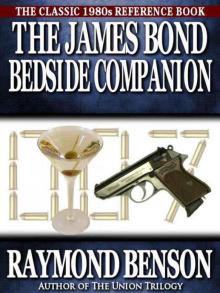 The James Bond Bedside Companion
The James Bond Bedside Companion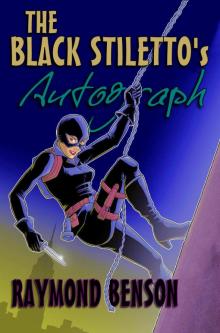 The Black Stiletto's Autograph
The Black Stiletto's Autograph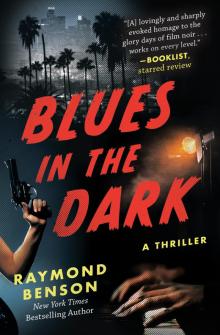 Blues in the Dark
Blues in the Dark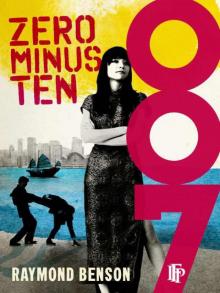 Zero Minus Ten
Zero Minus Ten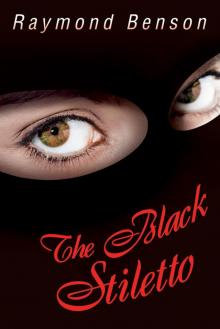 The Black Stiletto
The Black Stiletto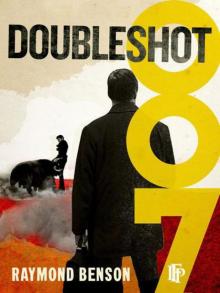 Doubleshot
Doubleshot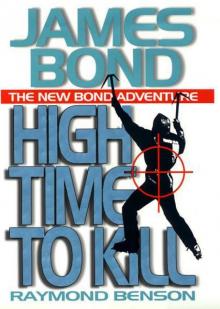 High Time To Kill rbb-3
High Time To Kill rbb-3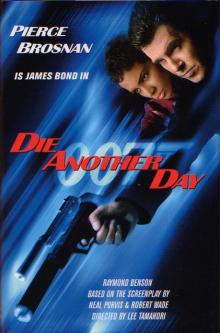 Bond Movies 07 - Die Another Day
Bond Movies 07 - Die Another Day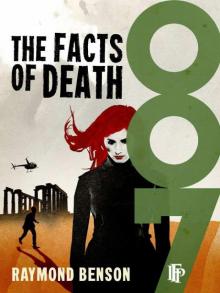 The Facts Of Death
The Facts Of Death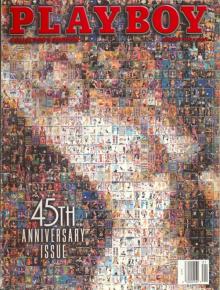 Midsummer Night's Doom
Midsummer Night's Doom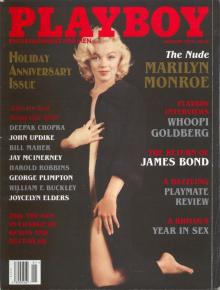 Blast from the Past
Blast from the Past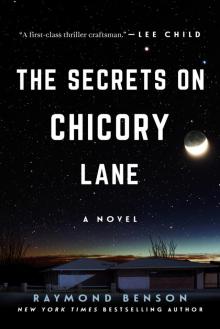 The Secrets on Chicory Lane
The Secrets on Chicory Lane High Time To Kill
High Time To Kill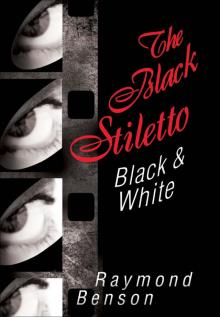 The Black Stiletto: Black & White
The Black Stiletto: Black & White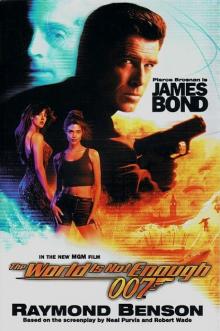 The World Is Not Enough jb-1
The World Is Not Enough jb-1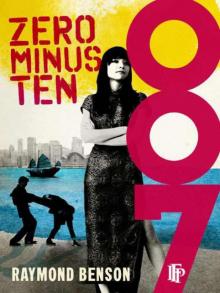 Zero Minus Ten rbb-1
Zero Minus Ten rbb-1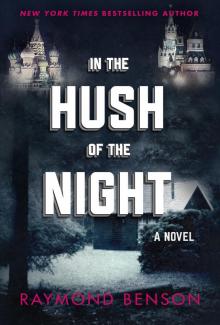 In the Hush of the Night
In the Hush of the Night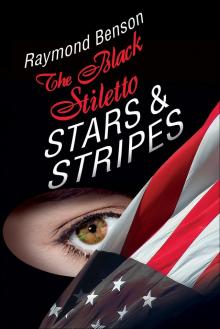 The Black Stiletto: Stars & Stripes
The Black Stiletto: Stars & Stripes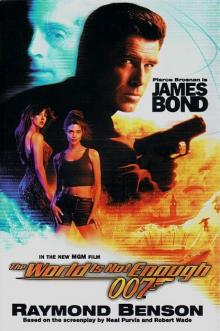 Bond Movies 06 - The World Is Not Enough
Bond Movies 06 - The World Is Not Enough The Rock 'n Roll Detective's Greatest Hits - A Spike Berenger Anthology
The Rock 'n Roll Detective's Greatest Hits - A Spike Berenger Anthology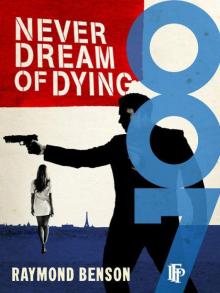 Never Dream Of Dying
Never Dream Of Dying